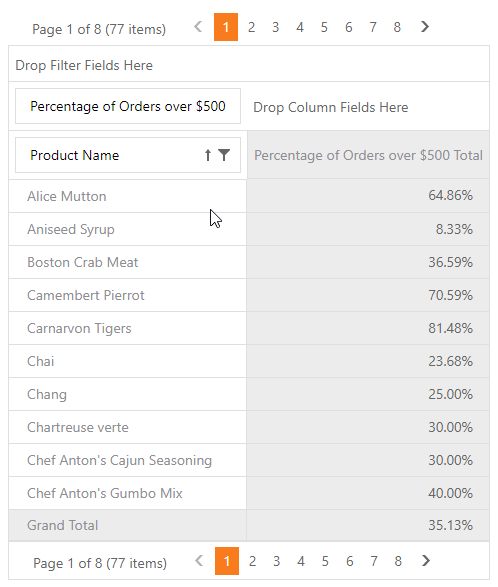This example demonstrates different approaches to calculate a custom summary.
The task is to calculate the percentage of units that cost over $50 and show that value in the total columns.

The following approaches are shown:
The CustomSummary event. A custom summary is calculated for the “Unit Price” field. The field’s SummaryType property is set to PivotSummaryType.Custom. The ASPxPivotGrid.CustomSummary event is handled to count the records whose total sum exceeds $50. The ratio of these records to all the records is assigned to the e.CustomValue parameter.
An unbound expression. A field is an unbound field with an expression that calculates the ratio.
Data Binding API. In Optimized mode create a field bound to the ExpressionDataBinding object with the following expression:
ToDecimal(Sum(iif([Extended_Price]>=500,1,0)))/Count()
View Example: How to Implement Custom Summary
<dx:ASPxPivotGrid ID="ASPxPivotGrid1" runat="server" DataSourceID="AccessDataSource1" Theme="Office365">
<OptionsData DataProcessingEngine="Optimized" />
<Fields>
<dx:PivotGridField ID="fieldProductName" Area="RowArea" AreaIndex="0"
Caption="Product Name" FieldName="ProductName">
</dx:PivotGridField>
<dx:PivotGridField ID="fieldExtendedPriceNew" Area="DataArea" AreaIndex="0"
Caption="Percentage of Orders over $500">
<DataBindingSerializable>
<dx:ExpressionDataBinding Expression="ToDecimal(Sum(iif([Extended_Price]>=500,1,0)))/Count()" />
</DataBindingSerializable>
<CellFormat FormatString="p" FormatType="Numeric"></CellFormat>
</dx:PivotGridField>
</Fields>
</dx:ASPxPivotGrid>
<dx:ASPxPivotGrid ID="ASPxPivotGrid1" runat="server" DataSourceID="AccessDataSource1" Theme="Office365">
<OptionsData DataProcessingEngine="Optimized" />
<Fields>
<dx:PivotGridField ID="fieldProductName" Area="RowArea" AreaIndex="0"
Caption="Product Name" FieldName="ProductName">
</dx:PivotGridField>
<dx:PivotGridField ID="fieldExtendedPriceNew" Area="DataArea" AreaIndex="0"
Caption="Percentage of Orders over $500"
UnboundExpression="ToDecimal(Sum(iif([Extended_Price]>=500,1,0)))/Count()"
UnboundType="Decimal"
UnboundFieldName="fieldExtendedPriceNew">
<CellFormat FormatString="p" FormatType="Numeric"></CellFormat>
</dx:PivotGridField>
</Fields>
</dx:ASPxPivotGrid>
<dx:ASPxPivotGrid ID="ASPxPivotGrid1" runat="server" DataSourceID="AccessDataSource1"
OnCustomSummary="ASPxPivotGrid1_CustomSummary" Theme="DevEx">
<Fields>
<dx:PivotGridField ID="fieldProductName" Area="RowArea" AreaIndex="0"
Caption="Product Name" FieldName="ProductName">
</dx:PivotGridField>
<dx:PivotGridField ID="fieldExtendedPrice" Area="DataArea" AreaIndex="0"
Caption="Percentage of Orders over $500" SummaryType="Custom"
CellFormat-FormatString="p" CellFormat-FormatType="Numeric"
FieldName="Extended_Price">
</dx:PivotGridField>
</Fields>
</dx:ASPxPivotGrid>
using DevExpress.Web.ASPxPivotGrid;
using DevExpress.XtraPivotGrid;
namespace ASPxPivotGrid_CustomSummary
{
public partial class CustomSummaryEventExample : System.Web.UI.Page
{
static int minSum = 500;
protected void ASPxPivotGrid1_CustomSummary(object sender,
PivotGridCustomSummaryEventArgs e)
{
if (e.DataField != fieldExtendedPrice) return;
// A variable which counts the number of orders whose sum exceeds $500.
int order500Count = 0;
// Get the record set for the current cell.
PivotDrillDownDataSource ds = e.CreateDrillDownDataSource();
// Iterate through the records and count the orders.
for (int i = 0; i < ds.RowCount; i++)
{
PivotDrillDownDataRow row = ds[i];
// Get the order's total sum.
decimal orderSum = (decimal)row[fieldExtendedPrice];
if (orderSum >= minSum) order500Count++;
}
// Calculate the percentage.
if (ds.RowCount > 0)
{
e.CustomValue = (decimal)order500Count / ds.RowCount;
}
}
}
}
Imports DevExpress.Web.ASPxPivotGrid
Imports DevExpress.XtraPivotGrid
Namespace ASPxPivotGrid_CustomSummary
Partial Public Class CustomSummaryEventExample
Inherits System.Web.UI.Page
Private Shared minSum As Integer = 500
Protected Sub ASPxPivotGrid1_CustomSummary(ByVal sender As Object, ByVal e As PivotGridCustomSummaryEventArgs)
If e.DataField IsNot fieldExtendedPrice Then
Return
End If
' A variable which counts the number of orders whose sum exceeds $500.
Dim order500Count As Integer = 0
' Get the record set for the current cell.
Dim ds As PivotDrillDownDataSource = e.CreateDrillDownDataSource()
' Iterate through the records and count the orders.
For i As Integer = 0 To ds.RowCount - 1
Dim row As PivotDrillDownDataRow = ds(i)
' Get the order's total sum.
Dim orderSum As Decimal = DirectCast(row(fieldExtendedPrice), Decimal)
If orderSum >= minSum Then
order500Count += 1
End If
Next i
' Calculate the percentage.
If ds.RowCount > 0 Then
e.CustomValue = CDec(order500Count) / ds.RowCount
End If
End Sub
End Class
End Namespace
